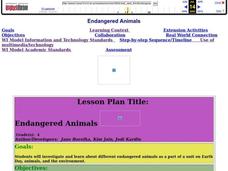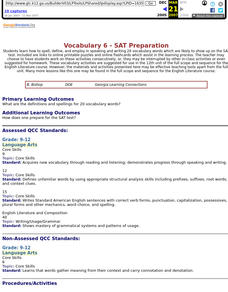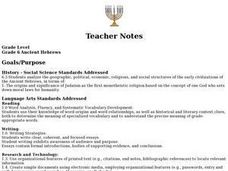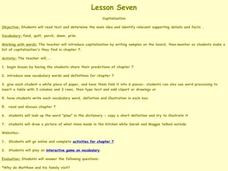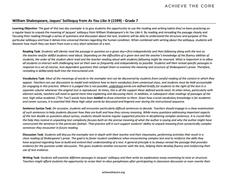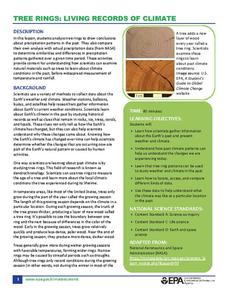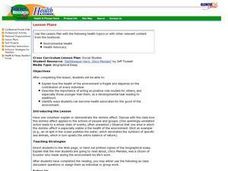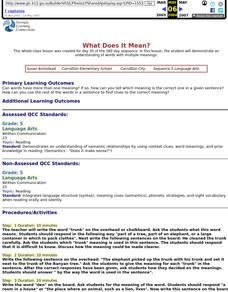Curated OER
Endangered Animals
Fourth graders research different endangered animals in media center as part of unit on Earth Day, animals, and environment, create project based around multiple intelligence related to an endangered animal, and produce Powerpoint...
Curated OER
Mystery Boxes: Uncertainty and Collaboration
Students manipulate boxes with unknown internal structure and contents to become familiar with the concept of uncertainty in science.
Curated OER
Vocabulary 6 - SAT Preparation
High schoolers discover how to spell, define, and employ in speaking and writing 20 vocabulary words which are likely to show up on the SAT test. Included are links to online printable puzzles and online flashcards.
Curated OER
What is Diabetes?
Students examine basic information about diabetes and related vocabulary words. They explore various health websites, complete a worksheet, discuss the worksheet answers and discuss diabetes myths vs. facts.
Curated OER
Cloze Instruction And Herringbone Technique
Students sort out important information and create a visual framework for reviewing in the future. They organize a large quantity of information thus helping with learning and remembering details, cause and effect, comparison and...
Curated OER
Ancient Hebrews
Sixth graders analyze the geographic, political, economic, religious, and social structures of the early civilizations of the Ancient Hebrews, and write an essay.
Curated OER
George Washington's Revolutionary Journeys
Students take a closer look at historical maps. In this American Revolution activity, students examine the provided historical maps and documents to determine the assignments that George Washington assigned to subordinates during the...
Curated OER
Introducing the Memo
Students explore memos to gather important information. In this memos lesson, students interpret memos and answer questions based on the information. Students define the parts of a memo. ...
Curated OER
Comparing Fiction and Nonfiction
Fifth graders compare and contrast an informational article with a fictional story. They read the story "The Contest" as a class, and discuss the different types of literature genres. Next, they complete a vocabulary worksheet and a...
Curated OER
Comic Strips
Second graders write and illustrate their own comic strip. Students can still look at the various comics brought in by the teacher. Remind students that this is a fun activity and that they should have fun with this activity. When...
Curated OER
Capitalization
Students investigate the concept of capitalization by reading relevant text and finding supporting details and facts. In this capitalization lesson, students read chapter seven in Working With Words and share predictions about the...
Curated OER
Friendship
First graders explore human psychology by reading a book in class. In this friendship lesson, 1st graders identify the benefit of friends and strong relationships while reading the book The Rainbow Fish. Students analyze the images from...
Curated OER
"As You Like It" by William Shakespeare
Jacque's soliloquy from Act II, scene ii of As You Like It sets the stage for a close reading exercise that models how to approach difficult, dense text and enables readers to practice reading comprehension and analysis...
EngageNY
Analyzing a Verbal Description
What function will describe the insect population growth? Pairs or small groups work together to determine which type of function and specific function will model given scenarios. The scenarios differentiate between linear,...
EngageNY
Analyzing a Graph
Collaborative groups utilize their knowledge of parent functions and transformations to determine the equations associated with graphs. The graph is then related to the scenario it represents.
Curated OER
Character in a Box
Partners choose, research, and analyze fictional or historical characters and design character life boxes to represent them. They also compose a rhyme royal, which they understand inductively by deconstructing examples. Based largely on...
US Environmental Protection Agency
Tree Rings: Living Records of Climate
Open with a discussion on weather and climate and then explain how tree rings can provide scientists with information about the earth's past climate. Pupils analyze graphics of simulated tree rings from various US locations for the...
Curated OER
Unwind: Directed Reading Thinking Activity
To generate interest in reading Neal Shusterman's young adult science fiction novel Unwind, class members engage in a Directed Reading-Thinking Activity (DRTA) that asks them to examine the front and back covers, the blurbs, and "The...
Curated OER
Because of Winn-Dixie
Readers analyze an excerpt from Kate DiCamillo's novel Because of Winn-Dixie. They read silently, and then hear it read aloud. Definitions for underlined vocabulary words are in the margin, and other potentially difficult words...
Curated OER
Because of Winn-Dixie
Take an in-depth look at a passage from Kate DiCamillo's Because of Winn-Dixie. Included here is the reading passage as well as a step-by-step procedure for reading the text, a set of text-dependent questions, and a final writing...
Curated OER
Unsent Letter: Characterization in Briar Rose
After completing Jane Yolen’s Briar Rose, class members assume the voice of Gemma and craft a personal letter to her granddaughter telling Becca how she feels about Becca’s actions and the discoveries at Chelmno. Complete directions for...
Curated OER
Biographical Essay
Tenth graders explore the importance of the environment and ow fragile it is.
Curated OER
What Does It Mean?
Pupils demonstrate an understanding of words with multiple meanings. They give the meaning for each "trunk" in the sentence.
Curated OER
My Secret War - The WWII Diary of Madeline Beck: Lesson 2
Fifth graders explore world history by reading historical fiction. In this World War II lesson, 5th graders read the story My Secret War and identify the importance of fiction when analyzing history. Students answer study questions about...
Other popular searches
- Free Using Context Clues
- Reading Using Context Clues
- Vocabulary Using Context Clues
- Using Context Clues in Science
